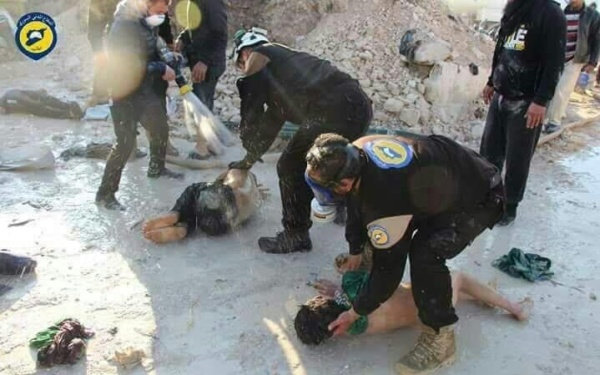White Helmets rescuers treat victims of the Assad regime’s sarin attack on Khan Sheikhoun in northwest Syria, April 4, 2017
UPDATE, FEB 4:
The UN Security Council has discussed the conclusion of chemical weapons inspectors that the Assad regime lied about a facility producing nerve agents.
The UN’s top disarmament official, Izumi Nakamitsu, summarized the findings of the Organization for Prohibition of Chemical Weapons that the Assad regime’s account “cannot be considered accurate and complete”.
Norway’s Ambassador Mona Juul commented, “No one has been held accountable for these atrocious acts. This is unacceptable.”
Juul expressed “full confidence in the OPCW and its Technical Secretariat”. Without naming Russia and the Assad regime, she continued, “Norway firmly rejects attempts to discredit or bring into disrepute the OPCW….Such attempts against the international community’s efforts in securing accountability and preventing use of Chemical Weapons are deeply concerning.”
French representative Nicolas de Riviere echoed, “There is no conspiracy, no instrumentalization, no pressure. Discrediting the OPCW simply because it is doing its job, and I would even say because it is doing its job well, is undignified and irresponsible.”
Estonia’s Sven Jürgenson added, “Just and lasting peace can only be achieved if the perpetrators of the war crimes and crimes against humanity are identified and brought to justice.”
And US Ambassador Richard Mills said:
The United States supports these and other efforts aimed at holding the Assad regime responsible for the use of chemical weapons and other ongoing atrocities against Syrian civilians, including mass detention, torture, and indiscriminate attacks on civilian infrastructure. Accountability, for all of this, will be essential to bring long-overdue justice to the victims and their families who need and deserve the international community’s support.
The Assad regime’s representative, Bashar al-Ja’afari, maintained that “Western countries continue to use the Organization for the Prohibition of Chemical Weapons…as a tool to exert pressure and political blackmail to serve the agendas”.
ORIGINAL ENTRY, FEB 3: The world’s chemical weapons watchdog says Syria’s Assad regime has lied about its facilities.
In a January 26 report, the Organization for the Prohibition of Chemical Weapons summarizes 19 “outstanding issues” that are unresolved, 6 1/2 years after the regime claimed that it had handed over all chemical agents and destroyed all facilities. The OPCW explains:
One of the 19 outstanding issues pertains to a CWPF [chemical weapons production facility] declared by the
Syrian National Authority as never having been used for the production of chemical weapons. The review of all the information and other materials gathered…since 2014, including samples, indicates that production and/or weaponisation of chemical warfare nerve agents took place at this CWPF.
Acting under the Chemical Weapons Convention, the OPCW asked the regime “to declare the exact types and quantities of
chemical agents produced and/or weaponised at the site in question”. However, it had “not yet received a reply to this request”.
The organization did not identify the suspect facility. However, it said that it had conducted inspections in November at the Barzeh and Jamraya facilities of the regime’s main chemical weapons complex, the Scientific Studies Research Center, and is analyzing samples.
The OPCW, saying its Declaration Assessment Team will visit Syria again this month, concludes:
Considering the identified gaps, inconsistencies, and discrepancies that remain unresolved, the Secretariat assesses that the declaration submitted by theSyrian Arab Republic still cannot be considered accurate and complete.
The UN and OPCW have found the Assad regime responsible for at least 34 chemical attacks, with chlorine or the nerve agent sarin, in Syria since 2014. The assessments do not include the sarin assaults near Damascus in August 2013, on opposition-held East and West Ghouta, that killed more than 1,400 people, as the Assad regime was then not a party to the Chemical Weapons Convention.
The OPCW concluded that the Assad regime, despite its proclamation of eliminating all chemical weapons, carried out the sarin attack on Khan Sheikhoun in northwest Syria in April 2017 which killed about 90 people and wounded hundreds. Last July, the organization added that the regime had struck nearby Lataminah with chlorine and sarin, days before the Khan Sheikhoun killings.
Inspectors have also found “reasonable grounds” that chlorine was used to kill 43 people in a building in Douma, near Damascus, as a pro-Assad offensive overran the East Ghouta region in April 2018. A report assessing responsibility is awaited.
Russia, the Assad regime, and supportive activists have carried out a sustained propaganda and disinformation campaign to undermine the findings, but have been unsuccessful in halting the OPCW’s investigations and analyses.


The OPCW also never explained how a cannister of chlorine that allegedly landed on a rooftop balcony, poisoned residents on the floors below – the gas would have dispersed into the air through convection.
The OPCW explained this in the final Fact Finding Mission report on Douma. The chlorine did not “disperse” through convection but funnelled from the canister on the roof down the building into the stairwell — thus the deadly potency of the chlorine.
https://www.opcw.org/sites/default/files/documents/2019/03/s-1731-2019%28e%29.pdf
S.